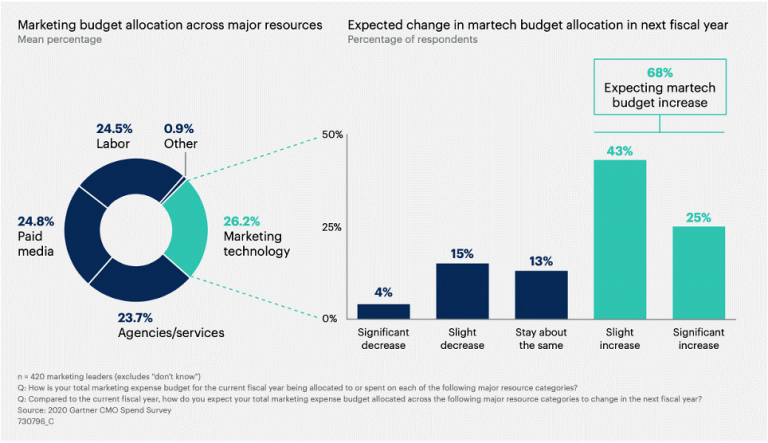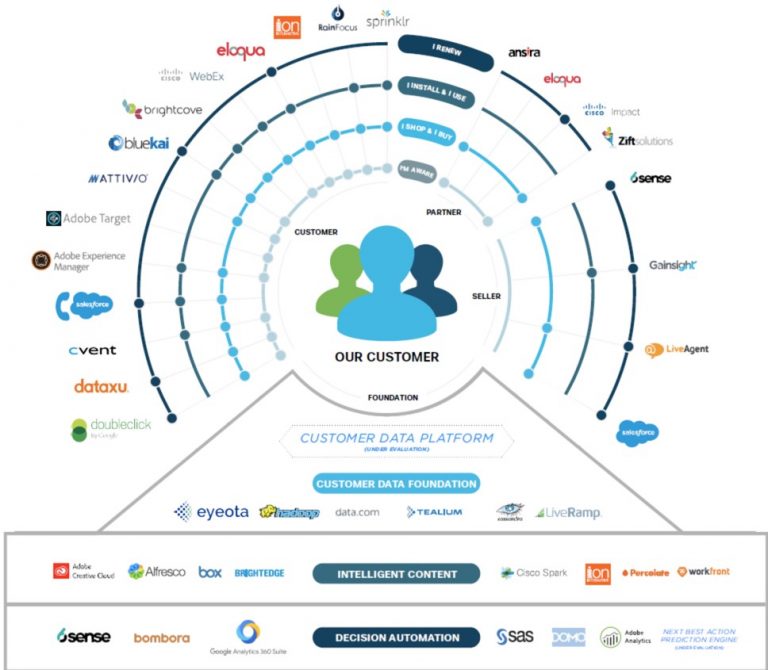Effectively using marketing technology to understand the customer, drive engagement, and measure ROI has become a top priority for marketers.
When consumers have a question or need to find a solution to a problem, they turn to search. It’s no wonder then that in 2020, businesses spent nearly $47.5 billion on SEO or SEO-related products and services.
COVID accelerated the shift to digital, and now CMOs and marketing leaders are turning to SEO and digital channels and technologies that, according to Gartner, account for almost 80% of budgets, with 59% of that going towards owned and earned digital media such as websites, SEO and mobile marketing.
Marketing technology stacks are a collection of software tools, platforms, and technologies used by enterprise marketers to improve efficiency, enhance collaboration and communication and drive multi-channel ROI.
As marketing leaders and CMOs alike renew their focus on marketing opportunities, the role of technology – alongside SEO – is becoming increasingly important.

In this article, I share insights into the role and importance of SEO in modern-day marketing technology stacks.
The Voice of the Customer
As the demand for search grows to an all-time high, the role of SEO has expanded to multiple areas of business.
Once a siloed channel, SEO is now part of holistic PPC and digital activities because SEO represents the most dynamic opportunities to understand the voice of the customer.
From understanding macro trends about consumer behavior to revealing granular search trends, SEO has become an invaluable business intelligence tool.
As organizations look to improve customer experience across all facets of their organization, SEO insights are helping them understand intent and important touchpoints along every part of the customer journey.
This helps organizations improve:
- Customer experiences.
- Products, services, sales, and pricing models.
- Customer engagement and time to decision and action.
- Operational and collaboration models – internally and externally.
Data, Insights, and Action
With so much data available to them, every type of organization and digital marketer can now leverage a combination of historical and, most importantly, real-time insights to fuel marketing stack success.
In particular, the importance of first-party SEO data is growing as Google looks to eliminate third-party cookies over the next few years.
The role of data and analytics is becoming even more critical in the development of organizations’ technology stacks as a result.
However, when looking at technology providers, marketers must ensure they utilize technology that has enhanced capabilities. In particular, organizations need access to structured data sets, real-time insights, and allow for automated action.
Machine learning technology now allows marketers to quickly identify opportunities almost instantaneously, create and activate content dynamically across multiple digital marketing channels.
Many organizations do not always have access to their data science teams and look to deep-learning technology to analyze complex and dynamic data sets.
This helps:
- Power real-time optimization.
- Utilize predictive analytics at scale.
- Personalize campaigns.
- Automate critical and time-consuming tasks.
The adoption and application of AI-driven search technologies help provide more intelligent, faster, and actionable insights focused on revenue improvements.
At the same time, automation allows teams to scale and improve their SEO campaigns and overall digital marketing return.
Integration and Performance
As marketing organizations are asked to take on more with fewer resources, technology is increasingly being used as a third resource/the extra person in the marketing team.
Fundamental market shifts have meant that SEO insights are now being used more and more to inform many other digital marketing activities, especially PPC.
However, with so many different tools and platforms available, it is mission-critical that marketers ensure their SEO technology can integrate with multiple elements of marketing technology stacks.
For example, sales and customer service, IT and design, content and PR, social and email all benefit from SEO insights such as:
- Informing sales and customer success teams on new trends and opportunities.
- Identifying potential for new products and services.
Likewise, other elements and sources of data – their paths and flows – can benefit SEO.
The most successful organizations choose technologies for complementary channels and adjacent ecosystems and look at how they can integrate and work together.
This can include:
- Customer Relationship Management (CRM).
- Content Management Systems (CMS).
- Digital Asset Management Platforms (DAM).
- Social Media Management Platforms.
- Project Management.
- Email Management.
- Search Analytics Providers (Google and alt sources).
- Digital Analytics Providers.
- Automation Management.
- Customer Experience Platforms (CX).
Organizations that focus on placing customer insights, data, and intelligent content central to their technology stack builds can use APIs and integrations to create highly effective cross-channel marketing strategies that perform.
SEO plays a critical role in all.

Conclusion
Making sure that SEO and SEM technology is a substantial and central part of your 2021 enterprise marketing stack ensures your cross-channel digital marketing activities are primed for success.
Search insights are the catalyst that drives content and the fuel that drives digital marketing alignment and collaboration around user experience.
As organizations look to turn marketing into revenue-generating centers, technology advancements play an essential role in understanding customer behavior and SEO collaboration across all areas of the organization.
Search is driving additional business benefits beyond its traditional remit, such as:
- Brand awareness.
- PR and reputation management.
- Product marketing.
- Employee and customer experience.
- Content and cross-channel activation.
- Retention and upselling.
- Inbound and outbound lead generation.
- Online and offline synergy.
Enterprise-grade technology is now moving the digital marketing revenue needle more than it has ever done before. Having the right technology in the right place of your marketing stack brings success beyond SEO.
Remember that each part of your marketing technology stack should be producing information that can be utilized for multiple functions and areas of digital marketing.
This is why platforms usually are better suited for large enterprises rather than numerous tools with disparate data sources.
They can add unnecessary complexity in an already high fragmented marketing technology landscape.
As marketing leaders in organizations look to rationalize budgets to align more with customer experience, SEO has become a pivotal source of information.
Now more than ever, advancements in technologies that help align and drive multi-function and multi-channel performance are taking center stage.
More Resources:
- A New Era of Enterprise SEO: 7 Opportunities to Embrace Today
- How Machine Learning Is Changing SEO & How to Adapt
- Enterprise SEO Guide: Strategies, Tools, & More
Image Credits





